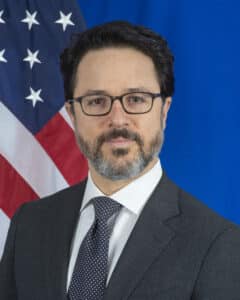But visiting State Department official underlines US support for the island although there is ‘more work to be done’
Cyprus must raise standards across the board if it is to clear its financial sector from any links to sanctions-evasion, a Department of State official said following a two-day visit to the island.
Erik Woodhouse, tasked with sanctions implementation oversight, met both government and industry stakeholders while in Cyprus. Speaking to a select pool of journalists including the Cyprus Mail, Woodhouse kept many of the details under the lid, choosing instead to reiterate US support for the Republic of Cyprus.
“There is always more work to be done,” he stressed, adding however the government of Cyprus “has expressed a commitment… to put in place even stronger and more effective authorities and mechanisms” that can ensure sanctions are effectively implemented and enforced.
Woodhouse sought to clarify that the waves of sanctions Cyprus was hit with in the past few months were not targeting the country or its people but were focused on crippling Russia’s aggression following the war in Ukraine.
“Our aim is squarely on Russia and those that are involved in Russia’s harmful activities.”
Woodhouse was last on the island in October but could not disclose what led to the sanctions that hit scores of Cypriot individuals and entities earlier this year, raising fears for the country’s services sector, that has been historically reliant on Russian clientele.
Nonetheless, he praised the “important steps Cyprus has taken over a number of years, including reducing and cutting down on activities of shell companies.”
Asked to comment if he had been briefed on the investigation that Cyprus has pledged to carry out through the attorney-general’s office on whether any of the sanctioned individuals committed any crimes under Cypriot law, Woodhouse said “I assume that investigation is happening in law enforcement channels, and given the independence of the law enforcement agencies, I assume that is in their sound management.”
He did not meet the attorney general but “other stakeholders in government.”
These included the undersecretary to the president as well as the president’s chief of the diplomatic office. In the private sector, he met stakeholders in the bar association, banking sector and accounting industry.
The meetings centered on concerns, as well as ways in which the government can follow through on its priorities. “But the key is to raise standards as a general matter,” he reiterated.
Asked if all parties were on the same page, Woodhouse limited his response to stressing “the government has made clear its strong and deep commitment to follow through. I think appropriately, they’re still in the process of deciding what the exact right steps will be.
“That’s just the normal part of policymaking.”

Over the past few months, the US has been largely focused on countering and limiting Russia’s ability to circumvent and evade sanctions and “I expect that those discussions will continue with partners here in Cyprus as well,” Woodhouse stressed.
Part of the aim of his visit “was to communicate the United States’ support for the Republic of Cyprus government and the private sector here for their work, enforcing and implementing sanctions, as well as to discuss next steps on this front.”
He described the meetings as productive, while highlighting that the US decision to impose sanctions was part of a multilateral effort involving a close partnership with the EU and all its member states, as well as partners from the G7.
Commenting on the fact that the EU did not adopt the US sanctions, he said that despite them being partners and allies “we each have our own processes and authorities that we use.” Even though the sanctions lists may not always be exactly the same, the objectives and alignment are very much aligned, he elaborated.
Nonetheless, he did not delve into the specifics of what Cyprus’ weak spots have been that eventually culminated in sanctions.
The sanctions hit financial fixers based in Cyprus, for “knowingly assisting” sanctioned Russian oligarchs hide their assets in complex financial networks.
Asked what direction the US wants to see Cyprus move in, Woodhouse stressed “what is important is to raise standards throughout. That’s why we engaged broadly with a number of parts of the private sector, and also discussed with the government what their priorities and concerns are.
“Cyprus has sustained its effort over a number of years to improve the standards and the oversight in its financial sector,” he added.
Nonetheless “that work needs to continue and we will continue to support the government of the Republic of Cyprus in those efforts.”
Concluding, Woodhouse said the work will never be done, because Russia will continue to find ways to work its way around these measures.
Stressing the importance of vigilance, Woodhouse highlighted the fundamental objective “is to help bring this war, this unjust invasion to an end. We have not achieved that objective yet.
“Our sanctions and export controls are intended to deny Russia the resources, both financial and material resources that it needs to sustain its invasion.”
Woodhouse expressed the belief that so far, the sanctions are having an impact, and leaving Russia with shortages of the goods that it needs to sustain its military.
“It’s less able to conduct the invasion, to conduct the invasion as it would like because of those shortages.
“Our work continues, the work is obviously not yet done. And we will continue to expand and intensify the sanctions and export control measures that we have put in place. For as long as it takes.”

